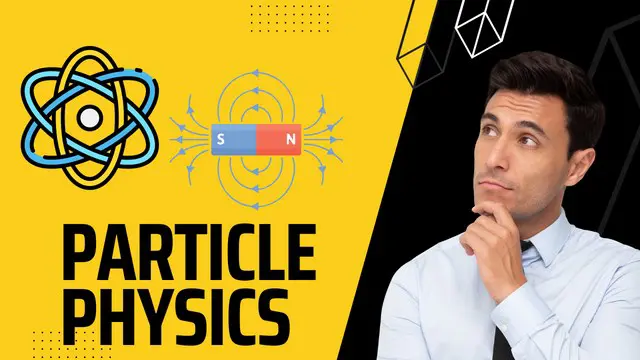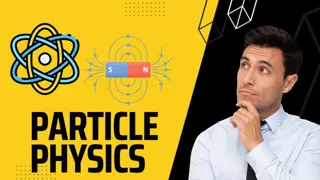
Particle Physics Level 3 Advanced Diploma
CPD Certified| Free PDF Certificate | Lifetime Access | Learner Support | No Hidden Fees | 100% Success Rate
Summary
- Certificate of completion - Free
- Reed courses certificate of completion - Free
- Tutor is available to students
Add to basket or enquire
Overview
The realm of particle physics is an ever-expanding universe of discovery and innovation. As technology advances and our understanding of the cosmos deepens, the demand for professionals in particle physics remains unwavering.
Job Demand:
- Data underscores the consistent demand for experts in particle physics. From academia to research institutions, there's a perpetual need for individuals who can push the boundaries of human knowledge.
Business Impact:
- In the business of science and technology, discoveries in particle physics often lead to groundbreaking innovations with far-reaching impacts, from medical advancements to environmental solutions.
Career Prospects:
- The world of particle physics opens doors to diverse career prospects, from research roles to teaching and scientific communication, offering a spectrum of opportunities.
Why You Should Consider This Role:
Pioneering Discoveries: Particle physics is at the forefront of scientific discovery, and professionals in this field have the opportunity to contribute to groundbreaking breakthroughs.
Advancements in Science and Technology: The knowledge and innovations in particle physics often have a domino effect, driving advances in various fields and improving human lives.
Intellectual Stimulation: If you're passionate about exploring the unknown, solving complex puzzles, and embracing intellectual challenges, this field offers a continual source of inspiration.
Global Collaborations: Particle physics transcends borders, with professionals often collaborating with researchers from around the world, fostering global unity in the pursuit of knowledge.
Shaping the Future: Your work in particle physics can have a lasting legacy, influencing the future of science, technology, and even policy-making.
Educational Roles: For those inclined towards education and communication, careers in teaching and science journalism allow you to share your passion for particle physics with the world.
Our Particle Physics Training provides you with the knowledge needed to delve into this captivating field. Whether you're seeking to advance your existing career, explore opportunities in scientific communication, or simply follow your intellectual curiosity, this training is your portal to the awe-inspiring world of particle physics.
Free Gift with Particle Physics Course
- Course Completion PDF Certificate
- Tutor Support
Certificates
Certificate of completion
Digital certificate - Included
Reed courses certificate of completion
Digital certificate - Included
Will be downloadable when all lectures have been completed
Curriculum
Course media
Description
Learning Outcomes:
Foundational Understanding of Particle Physics:
- Develop a comprehensive grasp of the principles, theories, and fundamental concepts of particle physics, allowing you to navigate the complex world of subatomic particles.
Mastery of Elementary Particles:
- Gain expertise in the classification and properties of elementary particles, enabling you to distinguish between quarks, leptons, and bosons, and comprehend their role in the universe.
In-Depth Knowledge of Nuclear Physics:
- Acquire in-depth knowledge of nuclear physics, covering the structure, behavior, and interactions of atomic nuclei, and their significance in both natural and experimental settings.
Understanding Particle Accelerators and Radiation Detectors:
- Develop an understanding of particle accelerators and radiation detectors, including their principles of operation, types, and applications in particle physics experiments.
Comprehensive Awareness of the Standard Model:
- Gain a comprehensive awareness of the Standard Model, the overarching theoretical framework that describes the fundamental particles and forces, and its implications in the world of particle physics.
Module Descriptions:
Introduction to Particle Physics:
- Module 1 provides an introduction to the field of particle physics, covering its history, significance, and its role in shaping our understanding of the universe.
Elementary Particles:
- Module 2 delves into elementary particles, including quarks, leptons, and gauge bosons, exploring their properties and their roles in the subatomic world.
The Nucleus:
- Module 3 focuses on the atomic nucleus, discussing its composition, binding forces, and its role as a central component of matter.
Nuclear Physics:
- In Module 4, you'll explore nuclear physics, covering nuclear structure, reactions, and the application of nuclear physics in various scientific and practical domains.
Particle Accelerators:
- Module 5 delves into particle accelerators, discussing their designs, functions, and their critical role in experimental particle physics.
Radiation Detectors:
- Module 6 emphasizes radiation detectors, their types, principles of operation, and their use in detecting and measuring subatomic particles.
The Standard Model:
- The final module, Module 7, offers a comprehensive understanding of the Standard Model, including its development, structure, and its role in unifying fundamental forces and particles.
This course equips you with a profound understanding of particle physics, from elementary particles to the Standard Model, offering a comprehensive education on the subatomic world and its fundamental principles.
Certificate of Completion
After completing the Particle Physics diploma course, you will be able to obtain your free PDF certificate of course completion.
Who is this course for?
Ideal Audience for this Course:
Physics Enthusiasts and Science Students:
- Undergraduate and postgraduate physics students, as well as science enthusiasts, interested in delving into the complex and fascinating world of particle physics.
Science Educators and Teachers:
- Educators teaching physics or related subjects at secondary or higher education levels looking to deepen their knowledge of particle physics to enhance their teaching.
Physics and Science Communicators:
- Individuals involved in science communication, science journalism, or content creation, seeking a comprehensive understanding of particle physics to effectively convey complex concepts to the public.
Researchers and Scientists in Other Fields:
- Researchers and scientists in related fields, such as astrophysics, materials science, or engineering, interested in broadening their scientific knowledge and exploring interdisciplinary connections.
Amateur Scientists and Citizen Scientists:
- Amateur scientists and citizen scientists passionate about exploring particle physics as a hobby or contributing to scientific projects.
Space and Astronomy Enthusiasts:
- Space and astronomy enthusiasts intrigued by the subatomic world and its connection to the universe, eager to expand their knowledge.
Curious Minds and Lifelong Learners:
- Lifelong learners with a curiosity about the universe, its building blocks, and the fundamental forces that shape our world.
STEM Program Students and Aspirants:
- High school or college students aspiring to pursue STEM (Science, Technology, Engineering, and Mathematics) programs and interested in gaining a head start in understanding the principles of particle physics.
Physics Hobbyists and Clubs:
- Physics hobbyists and clubs focused on exploring the mysteries of the universe, seeking structured learning in the field of particle physics.
Educational Institutions and Libraries:
- Educational institutions, libraries, and community centers aiming to offer comprehensive science education to their members and students.
This course is designed to cater to a broad spectrum of learners, from physics students and educators to science communicators, researchers, and curious minds eager to explore the intricate world of particle physics. It provides a foundational understanding of the subject, making it accessible to a wide range of audiences.
Requirements
Particle Physics
The Particle Physics course has no formal entry requirements.
Career path
- Particle Physics Research Assistant: Entry-level position with a typical UK salary ranging from £25,000 to £35,000 per year.
- Particle Physicist or Research Scientist: With experience and advanced degrees, salary can advance to between £36,000 and £60,000 annually.
- Senior Particle Physicist or Principal Investigator: Experienced professionals in these roles may earn £61,000 to £100,000 or more.
Questions and answers
Currently there are no Q&As for this course. Be the first to ask a question.
Reviews
Currently there are no reviews for this course. Be the first to leave a review.
Provider
Edurise is a leading course provider founded by a dedicated team of experts based in the United Kingdom. We provide virtual learning and training programs to the learners who are looking to boost their productivity. Our comprehensive courses cover a wide range of industries and sectors, with an emphasis on leadership, business wellness, and workplace safety.
We take pride in constantly improving the quality of our courses and expanding our course catalog, providing new opportunities for the learners to advance their careers.
Legal information
This course is advertised on Reed.co.uk by the Course Provider, whose terms and conditions apply. Purchases are made directly from the Course Provider, and as such, content and materials are supplied by the Course Provider directly. Reed is acting as agent and not reseller in relation to this course. Reed's only responsibility is to facilitate your payment for the course. It is your responsibility to review and agree to the Course Provider's terms and conditions and satisfy yourself as to the suitability of the course you intend to purchase. Reed will not have any responsibility for the content of the course and/or associated materials.

